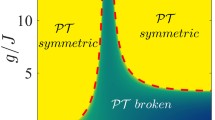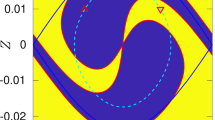Abstract:
We discuss the dynamics of two weakly coupled Bose-Einstein condensates in a double-well potential, contrasting the mean-field picture to the exact N-particle evolution. On the mean-field level, a self-trapping transition occurs when the scaled interaction strength exceeds a critical value; this transition essentially persists in small condensates comprising about 1000 atoms. When the double-well is modulated periodically in time, Floquet-type solutions to the nonlinear Schrödinger equation take over the role of the stationary mean-field states. These nonlinear Floquet states can be classified as “unbalanced” or “balanced”, depending on whether or not they entail long-time confinement of most particles to one well. Since the emergence of unbalanced Floquet states depends on the amplitude and frequency of the modulating force, we predict that the onset of self-trapping can efficiently be controlled by varying these parameters. This prediction is verified numerically by both mean-field and N-particle calculations.
Similar content being viewed by others
Author information
Authors and Affiliations
Additional information
Received 5 November 2000 and Received in final form 16 February 2001
Rights and permissions
About this article
Cite this article
Holthaus, M., Stenholm, S. Coherent control of the self-trapping transition. Eur. Phys. J. B 20, 451–467 (2001). https://doi.org/10.1007/PL00011106
Issue Date:
DOI: https://doi.org/10.1007/PL00011106




